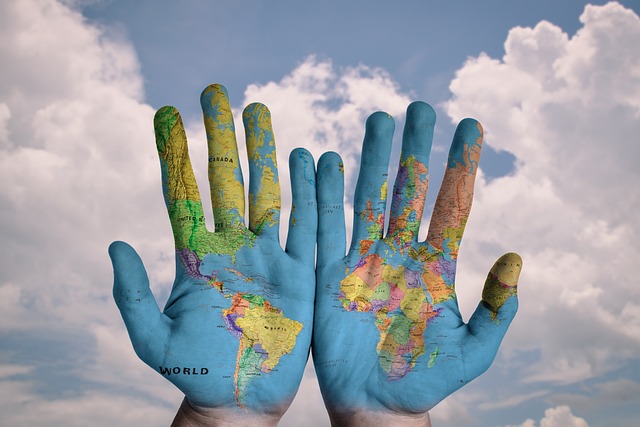By Vijayta Doshi, Ana Maria Peredo, & Chellie Spiller
Even though the lives of Indigenous peoples have been impacted by business practices (often negatively), they have been largely excluded from business and management research. Yet, Indigenous peoples have rich experiences and holistic community-based enterprises that can contribute significantly to management research and in exploring sustainable pathways urgently required for planetary health. In this e-conversation, the Editors of an upcoming Special Issue at Business & Society on Global Indigenous Peoples: Expanding the Intersection of Business and Society give deeper insights on the need to rightly recognize Indigenous populations, the role of businesses, and the role of management scholarship in elevating and amplifying Indigenous research. Read on to understand the vision of this Special Issue from the Editors themselves: Vijayta Doshi (Indian Institute of Management Udaipur), Ana Maria Peredo (University of Ottawa), & Chellie Spiller (University of Waikato)
Sarah: What motivated this Call for Papers?

Vijayta: In business and management scholarship, Indigeneity or Indigenous peoples has traditionally remained excluded as a research topic. However, the past few decades of scholarship have paved the way for interest in Indigenous issues from business and management perspectives. There is a vast scope for the advancement of this scholarship from varied contexts, especially the Global South. A couple of us, as part of the 2022 United Nations’ 15th Principles for Responsible Management Education (PRME) Global Forum’s panel discussion on ‘Indigenous Communities and Responsible Management Education: Opportunities and Challenges’, realized the need to initiate and expand this discussion in the form of a special issue.
Ana Maria: We have recently concluded the inaugural International Academy of Indigenous Research in Management and Organizations (IARIMOS) event, aimed at supporting emerging scholars. This Special Issue adds to our joint effort to elevate and amplify Indigenous Research in the field. This SI is an excellent opportunity for young researchers to publish their works and for mature researchers to add momentum to a vital enquiry. Management scholarship has not only largely excluded Indigenous Peoples, but also largely ignored the way that large MNC businesses and mainstream business ideology have negatively affected Indigenous livelihoods. A significant shift is happening as many Indigenous communities are taking control over their lives by creating, owning, and running community-based enterprises, and we need to document this. In the past ten years, research from and with Indigenous Peoples and communities has also begun to take root, and we want to help that flourish. One area important milestone has been recognizing the distinctiveness and innovation of Indigenous businesses. This SI is an opportunity to bring together Indigenous perspectives worldwide. In doing that, we can free ourselves from restricted understandings of business and organizations and dismantle colonial frameworks and practices perpetuating inequalities and marginalization.
Chellie: Curating spaces for Indigenous voices to be heard is a crucial activity for Indigenous academics. When we make our own spaces, we get to influence the review process, such as engaging our Indigenous colleagues as reviewers and offering feedback that is strengthening and affirming. It’s a form of activism in a citation marketplace that privileges Western knowledge and creates an isomorphic effect through review processes that shoehorn Indigenous research into dominant agendas. This Call for Papers helps maintain and grow the connective tissue between Indigenous researchers. Special Issues such as this one provide us with exciting new research, an opportunity to mature and expand our theoretical field, shine the spotlight on incoming stars, and give voice to lived experience.
Sarah: What are the issues when “unrecognized Indigenous populations are recognized, and misrecognized ones are rightly recognized”?
Vijayta: First, Indigenous populations of certain contexts have rarely been recognized in the business and management literature, almost erasing Indigeneity as an issue or Indigenous peoples’ existence in those contexts. For example, in India, Indigenous peoples are known as Adivasis or Scheduled Tribes, and constitute more than 100 million population. However, there is hardly any mention of them in the business and management literature. Thus, recognition, in such cases, would mean bringing their issues, challenges, and knowledges in the parlance of business and society scholarship. The second is that given the different usage of local terms for Indigenous populations within a country or across countries, sometimes there is inadvertent misrecognition. For example, Adivasis, as a community, is unique from the Dalits (stigmatized as ‘untouchables’) in the Indian context. However, studies often conflate the two, leading to further misrecognition of Adivasis. We hope that by focusing on the Indigenous populations across diverse contexts, such nuances in our understanding of divergent populations will get clarified and developed. The special issue aims to provide a platform wherein unrecognized Indigenous populations across the world are recognized, and misrecognized ones are rightly recognized to represent and include them in building just societies and businesses.
Chellie: We must be more aware of the issues of recognition, and Vijayta has given one such example. We must hold the flame of recognition for each other so that we do not leave others behind.
Sarah: How have business practices been affecting Indigenous lives and livelihoods?
Vijayta: Although business practices have impacted Indigenous lives and livelihoods in both positive and negative ways, there has been a net loss for the Indigenous communities – in terms of the erosion of the Indigenous cultures, geographies, climate, resources, traditions, languages, lifestyles, knowledges, leadership, entrepreneurship – as what underlies business practices is usually chronic capitalism and the notion of ‘development’ at the cost of valuing and acknowledging alternative ways of being. We hope that through this SI call, we will also be able to engage reflectively on what it means to have inclusive business practices beyond a superficial level of CSR.
Ana Maria: Indigenous Peoples possess great cultural riches, but in material and social terms, they are usually among the poorest of the poor in most countries. Their riches are too often sacrificed in the name of ‘business development’ and ‘economic growth.’ For example, extractive industries such as mining and oil operating in Indigenous territories cause tremendous social, cultural, and ecological damage, and colonial models of entrepreneurship and enterprise work against alternative forms that grow out of their heritage. This is the kind of social and environmental injustice that we, as management scholars, need to document, learn from, and stand up to.
Chellie: Increasingly, the body of work by Indigenous researchers bears testimony to the incredible resilience and innovation of Indigenous business practice. We see Indigenous businesses with a long-term intergenerational purpose, delivering multi-dimensional well-being, and not simply pursuing profit. They are stewards in service to the environment and have practical impact within their communities. We need more stories about what Indigenous businesses are doing and identifying their successes and the pressure points to support more humane, life-giving, and world-nourishing business practices.
Sarah: Any suggestions on how Indigenous Peoples can be included in attaining the SDGs?

Vijayta: This is where the issue of recognition that we highlight is important. We will move a step closer to attaining SDGs only when we practice recognition in our scholarly activities. By recognition, we mean respectfully recognizing all unrecognized Indigenous populations, and rightly recognizing the misrecognized Indigenous population. Indigenous populations are relevant and have the potential to contribute to each and every one of the 17 SDGs in meaningful ways. One important step would be to not assume Indigenous populations to be homogenous so that we can understand their unique challenges and work with them towards attaining the SDGs. Secondly, we need to move beyond mere representation of Indigenous peoples to genuinely valuing Indigenous voices by considering them worthy of listening to and bringing them into center-stage from the periphery.
Ana Maria: Indigenous Peoples are organizing themselves not just to protest, but also to build successful businesses and financial institutions on their own terms, building on their own cultural and other resources to remake their communities in their own way.
Sarah: What role can be played by management scholarship in understanding Indigenous peoples?
Vijayta: Management scholarship has a considerable role to play in understanding Indigenous peoples. Indigeneity and Indigenous peoples have been part and parcel of scholarships in allied fields of management such as anthropology, sociology, history, geography, and environmental studies. However, management scholarship has lagged so far. At the same time, management scholars have much to offer by studying from the perspective of management, business, and society. Our SI aims to provide space to those inter-disciplinary inquiries as well as advance what management, as a discipline, has to offer uniquely in understanding Indigenous peoples, including and beyond issues such as Indigenous entrepreneurship, leadership, management, cultures, organizing, and so on.
Ana Maria: Society is calling for businesses to contribute positively to society, and in responding to that call, the field of management research has a great deal to learn from Indigenous peoples. Indigenous peoples are highly diverse, and academics are coming to recognize the importance of entering into Indigenous traditional ecological knowledge in all its diversity, building different models of enterprises such as community-based enterprises (CBEs). CBE presents an alternative, holistic development model that emerges from Indigenous experiences and considers cultural, social, and ecological goals. We need to learn from Indigenous models of enterprises, their aspirations, benefits, and challenges that emerge in various contexts.
Chellie: Here is what I said when asked a similar question in the context of the future of leadership studies and I believe it also holds for management scholars:
Stop, pause, and discern would be the first practical step. Amidst the pressure to teach and publish, carve out some waypoints on your journey and take time to learn about Indigenous Wisdom. Curiosity called each of us to be scholars of leadership, and opening to other ways of knowing opens new vistas. There is a vast body of work by Indigenous leadership scholars across multiple disciplines. Take time to read and dwell in these works. Include these works in your teaching content with discernment and respect. Engage with what is happening in Indigenous communities in your area: attend the events, go to the exhibitions and theater, watch Indigenous documentaries. Learn and listen—not teach and talk.
Sarah: Could you shed more light on Indigenous epistemologies?

Vijayta: The way we, as business and management researchers, understand or try to understand (through methodologies) the world may be very different from how Indigenous peoples understand and live their worlds. Uncovering Indigenous epistemologies requires openness to use innovative methodologies, either adapting the known methodologies (e.g., ethnography, visual ethnography, community-based action research, historical analysis, participatory action research, and storytelling) or developing/discovering contextually embedded novel methodologies (e.g., symbiotic allegory). What is at the heart of understanding Indigenous epistemologies is appreciating, admiring, and being open to Indigenous ways of knowing and engaging (or improvising) that would help scholars understand the phenomenon of interest in embedded and contextualized ways. This special issue welcomes diverse epistemologies.
Ana Maria: Indigenous worldviews typically see the world more holistically, with humans and non-humans bound together in an interacting whole. Learning from that way of seeing things opens possibilities for alternative ways to address the complex social, cultural, spiritual, and political challenges we, as human civilization, face. The concept of Two-Eyed Seeing, developed by Mi’kmaw Elder Dr. Albert Marshall, emphasizes the integration of Indigenous knowledge and Western scientific knowledge as complementary ways of understanding the world and behaving as integrated parts of it. We need to ask how our business institutions and ways of conducting business would be different if they were informed by Indigenous knowledges. Our SI invites scholars to engage in that questioning.
Chellie: Indigenous peoples are often defined by others in relation to colonization and although there is dazzling heterogeneity, there are some bedrock ideas that we share. For example, sacred cosmogenealogies and creation stories, a deep belief in sacred ecologies, the way we see the human in relation to the world as kin, appreciation of wisdom that has been tested through the millennia and comes to us as the gift of knowledge, to be good ancestors of tomorrow. These philosophies and associated practices are not stripped out of Indigenous entrepreneurial endeavor but are often at the center of it.
Sarah: What are your hopes for this special issue – for theory and practice?
Vijayta: We have high hopes for this special issue. We believe that it has the potential to advance the current theories about Indigeneity and Indigenous populations at the intersection of business and society. Also, through our explicit call for scholarship from under-researched contexts and Global South, we hope to see novel voices and ideas. Through these contributions, societal and business practices will be able to draw reflective implications and get enriched toward inclusivity.
Ana Maria: We hope to contribute to expanding business and management studies by understanding and supporting Indigenous knowledges and practices. We want to amplify the voices of Indigenous peoples, particularly from the Global South, and the voices of non-Indigenous who are seriously engaged from a perspective that respects and learns from the Indigenous standpoint.
Chellie: Vijayta and Ana Maria have covered it beautifully. I would add: some new faces and new constellations of effort.
Sarah: Any pointers for interested authors who might have good ideas on contributing to this call?
Vijayta: To improve your chances for consideration in this special issue, first, please ensure that your manuscript explicitly focuses on topics concerning business and society. Second, your manuscript needs to make a robust theoretical contribution. You may find the Business & Society editorials (shared further below) helpful to understand the journal’s expectations and craft a suitable manuscript.
Ana Maria: As the call for paper is comprehensive regarding Indigenous research at the intersection of business and society, many topics can be addressed and built upon previous research to move forward in this important field. We are open to a variety of theoretical and methodological approaches. We also understand that language can be a barrier. Fortunately, the Business & Society journal has been generous and will provide some financial support for translation on a case-by-case basis.
Chellie: Be daring and ground your work in your cultural worldview. We encourage centering work in relevant Indigenous methodologies, theory, and practice– tell us how you went about the research.
Literature for understanding Business and Society Journal’s vision:
Bapuji, H., & Higgins, C. (2023). Leadership for inclusion and impact: A renewed vision for Business & Society, 62(1), 3-8.
Crane, A., Henriques, I., Husted, B. W., & Matten, D. (2015). Defining the scope of Business & Society. Business & Society, 54(5), 427-434.
Crane, A., Henriques, I., Husted, B.W., & Matten, D. (2016). What constitutes a theoretical contribution in the business and society field? Business & Society, 55(6), 783-791.
Crane, A., Henriques, I., Husted, B. W., & Matten, D. (2016). Publishing country studies in Business & Society: or, do we care about CSR in Mongolia? Business & Society, 55(1), 3-10.
Crane, A., Henriques, I., Husted, B.W., & Matten, D. (2017). Twelve tips for getting published in Business & Society, Business & Society, 56(1), 3-10.
We are looking forward to your submissions!
